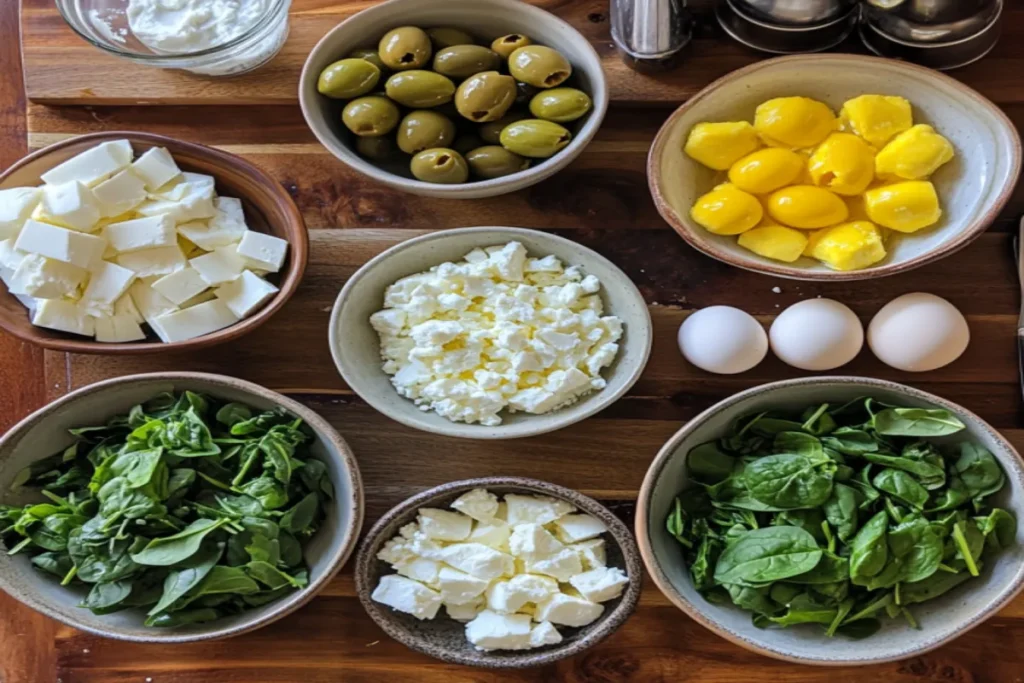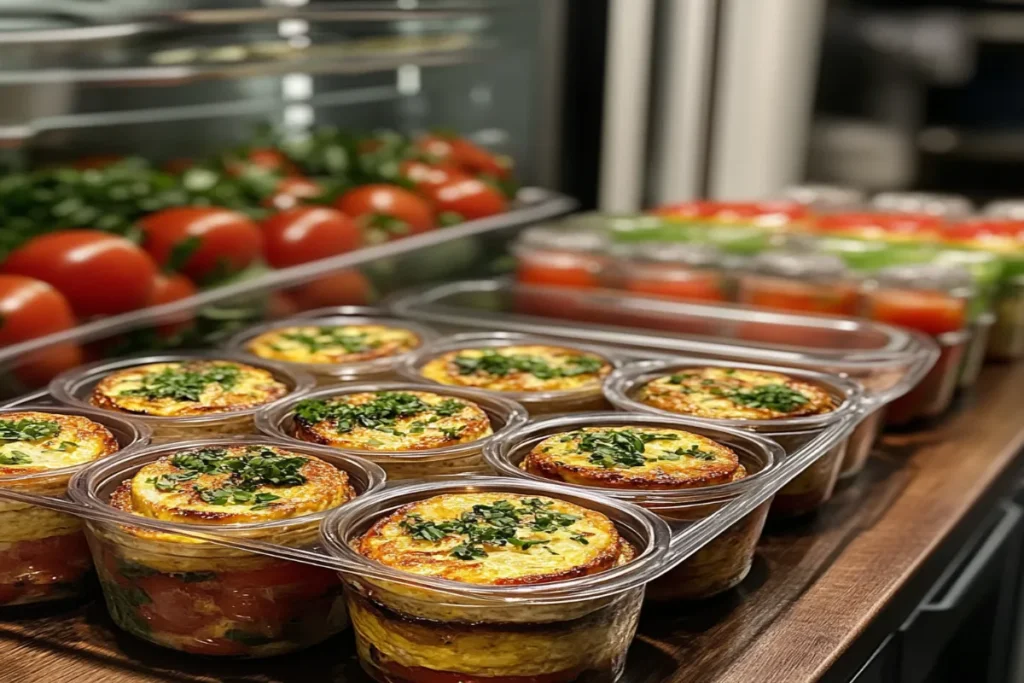Greek Egg Muffins – The Best 7-Ingredient Breakfast Recipe
Table of Contents
If you’re searching for a savory breakfast that’s packed with flavor, look no further than these Greek Egg Muffins. Made with fresh spinach, creamy feta, tangy olives, and fragrant herbs, they’re a wholesome way to kick off your morning. These muffins are easy to make, great for meal prep, and ideal for busy weekdays when you need something quick, tasty, and satisfying.
Don’t miss our Banana Oat Pancakes – Healthy One Bowl Breakfast for another easy morning favorite!
Introduction to Greek Egg Muffins
What Are Greek Egg Muffins and Why Are They Popular?
Greek Egg Muffins are mini baked egg cups filled with ingredients inspired by Mediterranean cuisine. They offer a portable, balanced breakfast option that’s rich in flavor and nutrients. Unlike sweet muffins, these are savory, protein-rich, and perfect to enjoy warm or cold.
Why people love them:
- They’re quick to prep and bake in under 30 minutes.
- They’re excellent for grab-and-go breakfasts or lunchboxes.
- You can easily make them ahead for the whole week.
Best of all, they’re endlessly customizable with your favorite cheeses, veggies, or herbs—all while keeping that bold, Greek-inspired taste.
Greek-Inspired Flavors That Elevate Your Breakfast
These muffins stand out thanks to iconic Greek ingredients:
- Feta cheese: Adds salty, creamy richness.
- Spinach: Delivers freshness and color.
- Kalamata olives: Brings a punch of umami and brine.
- Oregano & garlic: For that warm, aromatic Mediterranean base.
These flavors come together in a muffin that’s light, satisfying, and full of vibrant personality. Serve with a side salad or yogurt dip and you’ve got a brilliant Mediterranean breakfast.
Looking for more savory morning meals?
Check out our Cottage Cheese Pancakes with Chives Recipe for a creative take on high-protein breakfast.
Ingredients That Make It Greek
Low-Carb, Wholesome Ingredients That Fuel Your Morning
Greek Egg Muffins are naturally balanced with eggs, vegetables, and cheese, making them a complete meal in one handheld bite. Let’s break down the star ingredients that build the flavor and structure:
| Ingredient | Purpose in the Recipe |
|---|---|
| Eggs | Base protein and structure |
| Feta Cheese | Creamy, salty contrast to eggs |
| Spinach | Adds color, nutrients, and texture |
| Kalamata Olives | Provide briny, bold Greek essence |
| Garlic | Deepens the savory base |
| Oregano | Traditional Mediterranean seasoning |
| Cherry Tomatoes | Sweet-tart pop of freshness (optional) |
| Red Onion | Adds subtle sharpness and crunch |
Feel free to make swaps:
- Use parsley or dill instead of oregano.
- Replace feta with crumbled goat cheese for a twist.
- Skip olives if you want a milder taste—these muffins are highly adaptable.
Greek Flavor Staples: Feta, Olives, Spinach, and Herbs
Feta cheese is a cornerstone of Greek cuisine—crumbly, salty, and rich. Combined with spinach, it creates a creamy, earthy bite that contrasts beautifully with fluffy eggs.
Kalamata olives give each muffin a burst of Mediterranean brine, while dried oregano brings warmth and authenticity. Garlic adds depth without overpowering the other ingredients.
These staples are what transform a basic egg muffin into a Greek café-inspired breakfast that feels both nourishing and indulgent.
How to Prep Greek Egg Muffins

Whisking and Layering Ingredients
Getting the texture just right starts with how you prep the mixture. You’ll want to keep the eggs fluffy while distributing the fillings evenly.
Step-by-step:
- Crack 6 large eggs into a mixing bowl.
- Add a splash of milk or cream (about ¼ cup) for creaminess.
- Season with salt, black pepper, garlic powder, and oregano.
- Whisk until well combined and slightly frothy.
Next, prep your fillings:
- Chop spinach, olives, tomatoes, and onions finely.
- Crumble the feta and keep it dry (no excess brine).
- Lightly sauté the spinach if preferred for softer texture.
Portioning into Muffin Tins Like a Pro
- Preheat your oven to 350°F (175°C).
- Grease a 12-cup muffin pan well or use silicone liners for easy release.
- Add about 1–2 tablespoons of filling to each cup.
- Pour in the egg mixture, leaving a bit of space at the top.
- Sprinkle extra feta on top for a golden finish.
Bake for 18–22 minutes or until the tops are puffed and the center is just set. The muffins will firm up more as they cool.
Check out our Easy Blueberry Quesadilla Recipe for Breakfast for a contrasting sweet-and-savory morning combo!
Baking and Storage Tips

Oven Temperatures and Baking Times
These muffins are best baked at 350°F, which allows the eggs to set slowly and evenly. Overbaking can lead to rubbery texture—here’s how to get them just right:
| Muffin Size | Bake Time | Notes |
|---|---|---|
| Standard size | 18–22 minutes | Muffins should puff and not jiggle |
| Mini muffin pan | 12–14 minutes | Great for snack-sized bites |
Once done, let them cool in the tin for 5 minutes before transferring to a rack. This helps them firm up and prevents collapsing.
How to Store and Reheat for Busy Mornings
These egg muffins are meal-prep gold. Here’s how to keep them fresh:
- Store in an airtight container in the fridge for up to 5 days.
- Reheat in the microwave for 30–45 seconds, or in the oven at 325°F for 5–7 minutes.
For longer storage:
- Freeze individually on a tray, then transfer to a ziplock bag.
- Reheat from frozen in the microwave (1–1½ minutes) or oven (350°F for 10 minutes).
They’ll taste as fresh as the day you made them—ready whenever you are.
Don’t miss our Fluffy Cloud Eggs with Whipped Feta for another egg-based breakfast that’s as beautiful as it is tasty.
Greek-Inspired Variations to Try
Mediterranean Veggie Muffins
Want to keep it vegetarian but add variety? Try swapping in or adding:
- Sun-dried tomatoes
- Artichoke hearts
- Roasted red peppers
- Zucchini or shredded carrots
This makes the muffins heartier and more colorful—ideal for brunch or lunch.
Spicy Greek Egg Muffins with Peppers
Add heat with:
- Red pepper flakes
- Diced jalapeños or hot banana peppers
- A sprinkle of cayenne
Balance spice with creamy feta and olives for a muffin that has zing and comfort in every bite.
Health Benefits of Greek Egg Muffins
Low-Carb, High-Protein Fuel
Each muffin packs a punch of protein from eggs and cheese, keeping you full longer and stabilizing energy levels. With minimal carbs and no refined grains, it’s a cleaner breakfast choice that still satisfies.
| Nutrient (Per Muffin) | Approx. Amount |
|---|---|
| Calories | 110–130 |
| Protein | 7–9g |
| Fat | 8–10g |
| Carbs | 2–4g |
Perfect for those seeking clean, energizing fuel to start the day.
Mediterranean Diet Friendly
Greek Egg Muffins reflect key Mediterranean diet principles:
- Use of olive oil and plant-based ingredients
- Minimal processed foods
- Emphasis on vegetables, herbs, and natural cheeses
This style of eating is linked to better heart health, longevity, and energy balance—and it tastes amazing too.
Check out our Chia Pudding Parfait – A Nutritious Dessert to pair with these muffins for a well-rounded, wholesome start.
Pairing Ideas and Serving Suggestions
Savory Sides and Dips That Complement Greek Egg Muffins
These muffins pair well with light, tangy sides that balance the richness of the eggs and feta. Here are a few delicious ideas:
- Cucumber yogurt dip (like tzatziki) – Creamy, cool, and perfect for dipping
- Tomato and red onion salad – Adds crunch and freshness
- Avocado slices with lemon – Boosts good fats and fiber
- Sliced melon or citrus – A sweet counterbalance
Pair them with whole olives or roasted cherry tomatoes for a classic Mediterranean vibe.
Related resource: Explore the health benefits of the Mediterranean diet from Mayo Clinic
Best Drinks and Smoothies to Make It a Meal
To complete your breakfast, serve your muffins with a refreshing drink that fits the Mediterranean feel:
- Fresh mint tea or green tea
- Lemon water with cucumber slices
- Berry spinach smoothie with almond milk
- Iced black coffee or cold brew
For a dairy-free twist, try pairing them with a smooth almond or coconut milk latte.
Common Mistakes to Avoid
Overbaking or Undersalting
Egg muffins may seem foolproof, but a few common errors can ruin the texture or flavor.
- Overbaking makes them rubbery. Pull them from the oven when the center is just set—remember they continue cooking as they cool.
- Undersalting happens when you rely solely on feta. Add a pinch of salt to the egg mixture to bring everything together.
- Too many wet ingredients (like tomatoes or spinach) without draining them can lead to soggy muffins.
Not Using Grease or Liners
Egg muffins stick easily if you skip prepping your muffin tin properly. Always:
- Use silicone liners or thoroughly grease the tin with oil or non-stick spray
- Let them cool slightly before removing, to avoid breaking
Pro tip: Paper liners don’t work well here—they absorb moisture and may stick to the muffins.
External tip: BBC Good Food’s egg baking tips provide additional help with egg-based recipes and oven times.
Meal Prepping Like a Pro
Freezing, Thawing, and Reheating Tips
These muffins freeze beautifully and make weekly meal planning a breeze.
To freeze:
- Let muffins cool completely.
- Freeze individually on a tray.
- Transfer to a ziplock freezer bag.
To reheat:
- Microwave: Wrap in a paper towel and microwave for 1 minute.
- Oven: Bake at 350°F for 10–12 minutes until warmed through.
They’ll keep for up to 2 months in the freezer and 5 days in the fridge.
How Long Do They Last in Fridge or Freezer?
| Storage Method | Time Lasts | Notes |
|---|---|---|
| Refrigerator | 4–5 days | Use airtight container |
| Freezer | Up to 2 months | Freeze individually first |
This makes them perfect for school lunches, quick breakfasts, or even afternoon snacks.
Learn more about safe egg storage from the USDA
FAQ Section: Greek Egg Muffins
Are Greek egg muffins good for weight loss?
Yes, Greek egg muffins are a great option for weight-conscious eaters. They’re rich in protein, low in carbs, and keep you full longer. Their high nutrient density makes them an ideal choice for balanced eating.
Healthline on high-protein breakfast benefits
Can I make Greek egg muffins without cheese?
Absolutely. You can omit the feta and still have a flavorful muffin. To maintain richness, substitute with sautéed mushrooms or a dairy-free alternative like almond-based cheese.
How long do Greek egg muffins last in the fridge?
They stay fresh for about 4 to 5 days in the refrigerator when stored in an airtight container. Let them cool before sealing to avoid condensation.
What makes these egg muffins Greek-style?
The use of feta cheese, Kalamata olives, spinach, and oregano ties the recipe to classic Greek flavor profiles, turning a basic egg muffin into a Mediterranean treat.
Can I freeze Greek egg muffins for later?
Yes. Let them cool, then freeze individually before storing in a ziplock bag. Reheat in the microwave or oven for a fast, flavorful breakfast.
Do I need to use muffin liners when baking?
It’s highly recommended. Either grease your pan well or use non-stick silicone muffin liners to prevent sticking and simplify cleanup.
Conclusion: Make Mornings Easier with Greek Egg Muffins
With just a handful of ingredients and a muffin tin, you can prepare Greek egg muffins that are as flavorful as they are functional. Whether you’re rushing out the door, meal prepping for the week, or hosting brunch, these muffins bring fresh Mediterranean taste to your table.
From creamy feta and briny olives to savory spinach and herbs, each bite delivers rich, wholesome satisfaction. They’re easy to store, easy to love, and endlessly versatile. Now that you’ve got the recipe—go bake a batch and enjoy breakfast the Greek way!
Looking for a healthy side or dessert?
Check out our Chia Pudding Parfait – A Nutritious Dessert that pairs beautifully with these muffins for a balanced start or finish to your day.







